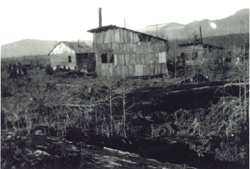The Stump Ranch
of the Upper Skagit Valley
Torrey Girls
"History of the James Daniel Torrey Family"

The Stump Ranchof the Upper Skagit Valley Torrey Girls "History of the James Daniel Torrey Family" |

|
Some BackgroundThe fact was that at the time of her death, according to her daughters she was tired, worn out, haggered and even though she was enjoying a more leisurely life with a new home in the city of Burlington [next to Mt. Vernon] with a garden she enjoyed working in, she was apparently ready for the long sleep. My best guess at her unknown diseases that caused her death would be diabetes, which ended the life of her daughter Eva Jane in 1943 and has shown up in numerous descendants since. Another irritation to the nine Boyd daughters of Alex and Doll was their fathers advise to each of them when they married was to not have as many children as their mother did, which he figured contributed to her death. The wide gap in the ages of Etta & Clara can be attributed to the death of two other sisters, as mentioned in this story; Georgetta Adielia was born 1848 (at the moment I believe the young lady pictured above left is Etta; according to Gladys Pape Miller, who we're indebted for the pictures) and Clara born 1856-1857 in Illinois; Jane 1846-1847. The only son Ira Torrey was born 1860 and I will be posting his obituary in the near future. According to the wedding certificate of George Savage to Georgetta A. Torrey, they were married at the Omaha Mission, Nebraska, July 1865 directly following the end of the Civil War. The witnesses were Georges father Jehiles Savage and Ettas sister Eva Jane Torrey, which would indicate this as the mission Jane was working for as mentioned in this story. Olive Clara Torrey married Lewis Alexander Boyd at the age of 14 sometime early 1869, as their first child Archie was born July 1870, one of the first children born in the area soon to be Antelope County Nebraska. It's a fun but long story and I haven't divided it into chapters yet, so you might want to print it a each side of your pages. |